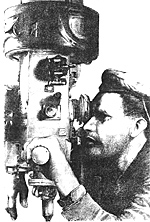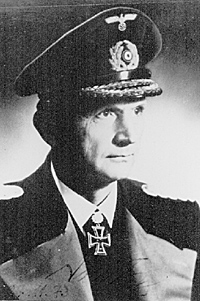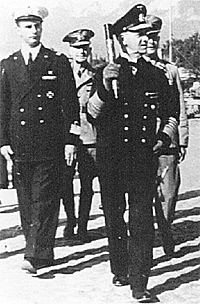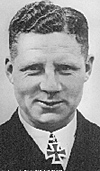
PETER HANSEN (251-LIFE-1987) spent time working for the ABWEHR (the German Secret Service) during WW II and he has information that is known to a mere handful of people. He gives this secret information especially to SHARKHUNTERS. Here he tells us:
Germany & Russia Working Together?
Karl Dönitz (at right) was never involved in the Reichswehr secret armament and training arrangements in Russia or for that matter, of Russian officers and specialists in Germany between roughly 1926 and 1933. He also never visited Russia individually officially or as a private visitor. All people involved were Army folks only, in spite of the fact that there was also a heavy secret Air Force involvement and exchange of aircraft designs, but at the time, everything like that was still under the Reichswehr Army Departments only before a separate Luftwaffe was officially started up.
 Vice Admiral Helmuth Heye as Chief of the KdK is another story. Heye later on was reactivated also for the Bundsmarine and became one of its Inspectors. Whilst he was probably one of the smartest officers in the Kriegsmarine and also one of the even fewer ones who spoke their minds candidly generally, Heye never had anything to do with or even stepped aboard a U-Boat and thus literally knew nothing about U-Boats, their technical pros and cons, and what they could be doing or for that matter, what would be almost impossible for them to achieve technically.
Vice Admiral Helmuth Heye as Chief of the KdK is another story. Heye later on was reactivated also for the Bundsmarine and became one of its Inspectors. Whilst he was probably one of the smartest officers in the Kriegsmarine and also one of the even fewer ones who spoke their minds candidly generally, Heye never had anything to do with or even stepped aboard a U-Boat and thus literally knew nothing about U-Boats, their technical pros and cons, and what they could be doing or for that matter, what would be almost impossible for them to achieve technically.
U-Boats Were Super Secret
U-Boats were surrounded by a very heavy cover of super-secrecy and even Navy officers serving either on other ships or even in the Higher Navy Commands were NOT EVER permitted to even walk through a U-Boat until somewhere around 1941 or thereabouts, when these excessive secrecy shields were partially relaxed.
Consequently, Helmuth Heye for lack of better information and personal experience, unfortunately, held the general surface fleet opinions and ideas and stuck to them during the famous “Z” Plan discussions, when the ‘Gun Club’ Admirals decided what form, shape and composition the future German Navy ought to have and when U-Boats were practically sidelined and largely disregarded; only Admiral Boehm voted for a substantial upgrading and increase in U-Boats soon; he being a former U-Boat Commander from World War I but he was outvoted by the majority, including Helmuth Heye, who was the most junior man amongst the bunch of Admirals however, even other former U-Boat Captains from WW I likewise voted for the bigger battle wagon fleet and German prestige navy instead.
Dönitz Kept in the Dark
 Karl Dönitz of course, was not aware of these discussions nor was he consulted being, at the time, a comparatively lower ranking Korvettenkapitän (Commander) only. But even after he had been posted as FdU and been promoted to Fregattenkapitän and taken over the U-Boat Service, when these discussions that dragged on over an extended period of time.
Karl Dönitz of course, was not aware of these discussions nor was he consulted being, at the time, a comparatively lower ranking Korvettenkapitän (Commander) only. But even after he had been posted as FdU and been promoted to Fregattenkapitän and taken over the U-Boat Service, when these discussions that dragged on over an extended period of time.
(Raeder, at right)
He was nevertheless still considered too inconsequential to even be informed, much less asked to participate or contribute to these negotiations that set the track for the development in an entirely false direction by the German Navy. However, the result was that Karl Dönitz, then the most senior full Captain on the ranking list, had only 56 U-Boats in service on September 3rd, 1939 and of these, almost half only were the smaller coastal boats of Type II as well as a handful still in their breaking-in training period, instead of the 300 that Karl Dönitz had demanded from Erich Raeder and the OKM – but this was considered so unrealistically excessive, that these repeated requests from Karl Dönitz were just dead-filed and made the point of many jokes by the fossilized Admirals at the Navy High Command in Berlin, preceding any possibility of fighting an effective sea war for Germany. It is indicated that only in late summer of 1941 enough newly built U-Boats joined U-Boat Command to reach not only again, that starting number of 56 and finally to exceed it, before then losses had often exceeded new additions, which reached the front lines only in trickles until practically two years after the start of the war and the so-called tonnage war.
One Dangerous Pike – Many Carps Ship Him off to Cruiser Duty
Admiral Wilhelm F. Canaris called the then Captain Helmuth Heye the only pike in a big pond full of carps, when he referred to the overstaffed OKM Naval Ministry. Helmuth Heye in 1939 also prepared a super-secret report stating that Germany and its small fleet simply could not win the tonnage war against Great Britain. Erich Raeder recalled all of the ten copies, put them into his personal safe and Heye was immediately posted quietly away from the Navy Ministry to sea duty, being named as Captain of the heavy cruiser ADMIRAL HIPPER, a position for which was really considered rather junior still – but people with such ‘upsetting’ thoughts and independent ideas were just too ‘dangerous’ to be kept on in Berlin. Naturally, all these conclusions were based entirely upon the sole underwater use of U-Boats – their slowness and very limited capability to change positions underwater. Nobody even gave a passing thought to using U-Boats on the surface, like torpedo boats as was later on done individually or in groups, using the so-called Rudel or Wolf-Pack tactics.
Use of Political Officers
Political officers were only gradually and slowly introduced into the German Navy after the 20th of July 1944 and then mostly in shore commands, naval coastal artillery commands and on the few bigger surface ships still around, plus staff commands. Most of them, with a handful of exceptions, were simply regular officers who were assigned this additional job. For example – a favorite were Navy doctors, as they usually had very little to do normally and were the only officers having frequently some time on their hands. While there were occasionally attempts by a few overeager martinet types, usually reserve or reactivated officers, to push political lectures and such rubbish, it never amounted to anything because virtually anybody who could manage to get away from them did so – from enlisted men to officers.
But Not the P. K.
Now the P.K. (Propaganda Kompanie) fellows, these were assigned right from the start of the war – some directly to certain Fleet Commands, others individually on a case by case basis. Every one of these chaps was a reservist, most of them in peacetime professions like newspaper columnists, magazine editors, writers, painters or photographers because some also painted or took pictures for the newsreels only instead of writing reports for the general civilian population telling them what the Army, Luftwaffe and Navy were doing.
 They did not generally write anything for internal use in military publications and also had no say-so about what was to be done operationally. Many of them were considered technical specialists and were often given designations as ‘Sonderführer” to allow them more flexibility and improve their acceptance by the military who then had to treat them somewhat like lower grade officers, even if they were from a military point of view, pure civilians pressed into the uniform and ground out from basic training camps with a special extra speed course of only four weeks basic training and instruction usually.
They did not generally write anything for internal use in military publications and also had no say-so about what was to be done operationally. Many of them were considered technical specialists and were often given designations as ‘Sonderführer” to allow them more flexibility and improve their acceptance by the military who then had to treat them somewhat like lower grade officers, even if they were from a military point of view, pure civilians pressed into the uniform and ground out from basic training camps with a special extra speed course of only four weeks basic training and instruction usually.
Later on many qualified as reserve officers U-Boat Command had Dr. Wolfgang Frank from the start of the war. He participated in various U-Boat war patrols. Others were periodically assigned through a coordinating office in Berlin to specific fleet units or commands, including Lothar Günther Buchheim, who sailed on minesweepers, torpedo boats and destroyers before he was assigned to U-96 under Heinrich Lehmann-Willenbrock (Member #120-+-1985) (at right)in the late fall of 1941 and later on for two patrols to U-309 under Mahrenholz in 1944.
More of this never before told information from the World War II U-Bootwaffe in KTB #165 next month. The information from PETER is almost always brand new to history and read first on the pages of our KTB Magazine. Thanks, PETER.
Back to KTB # 164 Table of Contents
Back to KTB List of Issues
Back to MagWeb Master Magazine List
© Copyright 2002 by Harry Cooper, Sharkhunters International, Inc.
This article appears in MagWeb (Magazine Web) on the Internet World Wide Web. Other articles from military history and related magazines are available at http://www.magweb.com
Join Sharkhunters International, Inc.: PO Box 1539, Hernando, FL 34442, ph: 352-637-2917, fax: 352-637-6289, www.sharkhunters.com
